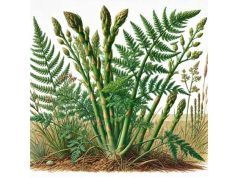
African basil, also called clove basil or “scent leaf,” is one of those kitchen herbs that quietly behaves like a full herb cabinet. Its warm, clove-like aroma hints at why it has a long history in West and Central African cooking and traditional wellness routines—especially for digestion, seasonal respiratory discomfort, and mouth and skin hygiene. What makes Ocimum gratissimum distinctive is its naturally strong essential-oil profile (which varies by growing conditions), paired with a broad mix of plant polyphenols that help explain its antimicrobial and soothing reputation.
Still, “natural” does not automatically mean “risk-free.” African basil can be used thoughtfully as food, tea, steam, or topical preparations, but concentrated essential oil requires extra caution. This guide focuses on practical, evidence-aware ways to use it, what benefits are realistic, how to dose common forms, and who should skip it.
Quick Overview
- May help support oral hygiene and breath when used as a rinse or tea.
- Often used for digestion and mild cramping, especially after heavy meals.
- Avoid internal use of the essential oil unless supervised by a qualified clinician.
- Typical tea range: 1–3 g dried leaf per cup, up to 2–3 cups daily.
- Avoid medicinal amounts if pregnant, breastfeeding, or using blood thinners or diabetes medicines.
Table of Contents
- What is African basil
- Key compounds and actions
- What African basil may help
- How to use it at home
- How much African basil per day
- Side effects and interactions
- What the evidence really shows
What is African basil
African basil (Ocimum gratissimum) is a strongly aromatic herb in the mint family (Lamiaceae). In everyday life, it often shows up in two places: the cooking pot and the “home remedy” tradition. In West Africa it is widely known as scent leaf (with many local names), and it is commonly used fresh—torn into soups, stews, and sauces at the end of cooking so the aroma stays bright. The flavor can be peppery and clove-like, which is why “clove basil” is a common nickname.
The plant’s appeal is not only culinary. Traditional use frequently focuses on the body systems that meet the outside world: the mouth, the gut, and the airways. People have used leaf teas or decoctions for stomach upset, diarrhea, and general “cooling” support during fevers. Leaves are also used as a simple rinse or gargle for mouth freshness and minor gum irritation, and as a wash for skin that feels inflamed or itchy.
One reason African basil sometimes confuses shoppers is its relationship to other basils. Sweet basil (Ocimum basilicum) is the mild, Italian-style basil used for pesto; it is not the same plant and usually has a gentler essential-oil profile. Holy basil (Ocimum tenuiflorum, also called tulsi) is yet another species with its own tradition and research base. African basil tends to sit between them in popular use: strong like tulsi, but commonly treated as a culinary vegetable like sweet basil.
A practical takeaway: if your goal is food flavor and everyday dietary support, fresh leaves are the simplest and safest place to start. If your goal is “medicinal strength,” the preparation method matters—especially when essential oil enters the picture. Concentration changes the risk–benefit balance dramatically, and this guide treats leaf preparations and essential oil as very different products.
Key compounds and actions
African basil’s “why it works” story comes down to two families of constituents: volatile oils (the aromatic fraction you smell) and non-volatile plant compounds (polyphenols and related antioxidants). Importantly, the herb does not have one fixed chemical fingerprint. It can express different “chemotypes” depending on genetics, soil, climate, harvest timing, and drying. That is why two bundles of scent leaf can smell noticeably different.
Volatile oils: the fast-acting aromatic fraction
The essential oil fraction commonly includes compounds such as eugenol, thymol, carvacrol, linalool, 1,8-cineole, and beta-caryophyllene (the exact mix varies). In general terms, these molecules are known in herbal medicine for actions like:
- Antimicrobial effects (helping inhibit certain bacteria or fungi in lab settings)
- Astringent and deodorizing effects (useful for oral-care traditions)
- Soothing effects on irritated tissues when diluted appropriately
- A “clearing” aromatic effect that can feel helpful during congestion when used as steam
Because these compounds are volatile and lipophilic, they act differently from water-based tea constituents. This is why the essential oil can feel “stronger” than the tea—and why it can also be more irritating or risky if misused.
Polyphenols and other phytochemicals: the steady support layer
In addition to the aroma chemicals, African basil leaves contain a broad set of polyphenols and flavonoids (often discussed in research for antioxidant and inflammation-modulating activity). In plain language, these compounds tend to work less like a “hit” and more like gentle support—helping the body manage oxidative stress and inflammatory signaling over time. That kind of activity is often discussed for metabolic wellness, tissue recovery, and general resilience, but it usually requires consistent intake and realistic expectations.
Why preparation changes what you get
- Fresh leaf in food: modest dose, broad mix, lowest risk
- Tea/infusion: captures many water-soluble constituents and a small fraction of volatiles
- Decoction (simmered): stronger extraction, but can also pull more bitter compounds
- Alcohol tincture/extract: broader extraction than tea
- Essential oil: highly concentrated aromatic chemicals; powerful, but easiest to overdo
If you remember one thing: leaf tea and essential oil are not interchangeable. They should not share the same dosing logic or safety assumptions.
What African basil may help
African basil is often used for practical, everyday complaints—situations where people want gentle support rather than a pharmaceutical-level intervention. The most realistic benefits tend to cluster around oral care, digestion, and “seasonal discomfort.” Research is still uneven (more on that later), so it helps to think in terms of potential and plausibility rather than guarantees.
Oral care and breath support
Traditional use as a gargle or mouth rinse makes intuitive sense because aromatic oils can reduce odor-causing microbes and leave a “clean” sensation. In real life, this may look like: a tea used as a rinse after meals, or a short-term herbal mouth rinse used during times of gum irritation. The goal here is support, not replacement of brushing, flossing, and dental care. If you see benefit, it is usually noticed quickly—within days—because the mouth is a direct-contact environment.
Digestive comfort after meals
Many people reach for scent leaf when the stomach feels heavy, gassy, or crampy. A warm tea can support digestion in several ways: hydration, mild antispasmodic effects, and a calming sensory cue that encourages slower breathing and a parasympathetic “rest and digest” state. In practical terms, it is most suitable for mild discomfort—occasional bloating, post-meal fullness, or transient cramping—not severe pain, blood in stool, or persistent diarrhea.
Seasonal respiratory comfort
African basil’s aromatic profile is one reason it is used in steams. Steam does not treat infections, but it can temporarily ease the feeling of congestion by humidifying airways and loosening mucus. If you use leaf steam, the benefit is typically immediate but short-lived. Tea can also feel soothing for a scratchy throat, mainly by warmth and hydration, with potential added comfort from aromatic compounds.
Skin cleansing and soothing routines
Diluted leaf washes are used traditionally for itchy or irritated skin. This is best thought of as a cleansing and comfort practice rather than a cure for eczema, fungal infections, or chronic dermatitis. If a rash is spreading, painful, oozing, or persistent, it deserves a clinician’s evaluation.
Metabolic and inflammation-related support
You may see African basil discussed for blood sugar balance, blood pressure, and general anti-inflammatory effects. These claims largely come from laboratory and animal research. As a practical home approach, scent leaf can be a helpful part of an overall lifestyle pattern—herb-rich meals, less added sugar, and regular movement—but it should not be positioned as a stand-alone treatment for diabetes or hypertension.
A grounded expectation is this: African basil is best used as a supportive herb for mild, common discomforts—especially when incorporated into food and routine care practices.
How to use it at home
The best use of African basil is the one you can do consistently, safely, and with clear purpose. Below are practical methods that respect both tradition and modern safety thinking.
1) Culinary use: the “daily advantage” method
Using fresh leaves in food is the safest, most sustainable approach. Add chopped leaves near the end of cooking to preserve aroma. This gives you a modest amount of active compounds without the intensity of extracts.
Ideas that work well:
- Stir into soups and stews in the final 2–3 minutes
- Add to omelets, beans, or lentil dishes after heat is off
- Mix into tomato-based sauces as a stronger alternative to sweet basil
- Combine with ginger and garlic for a warming, aromatic base
Culinary use is also the easiest way to avoid the “more must be better” trap. Food-level dosing rarely creates side effects unless someone is sensitive to the plant.
2) Leaf tea (infusion): gentle digestive and throat support
A standard tea is appropriate for digestion, mild cramping, or a scratchy throat.
Basic method:
- Add fresh leaves (or dried leaf) to a cup.
- Pour hot water over the leaves.
- Cover and steep 8–12 minutes.
- Strain and drink warm.
Covering matters because it helps keep aromatic compounds from evaporating. If you want a stronger tea, increase the leaf amount rather than steeping excessively long (over-steeping can become harsh and bitter).
3) Decoction: stronger, shorter-term use
A decoction (simmered preparation) is sometimes used traditionally when a stronger extraction is desired. Keep it conservative: simmer gently, covered, for 10–15 minutes. This is not automatically “better” than tea; it is simply different—and may be more likely to cause stomach upset in sensitive people.
4) Steam inhalation: for the feeling of congestion
Use leaves, not essential oil, unless you are experienced with essential oils and have a clear reason.
Simple steam:
- Place a handful of fresh leaves (or 1–2 tablespoons dried) in a bowl.
- Pour hot water over them.
- Lean over the bowl and inhale gently for 5–10 minutes.
Keep eyes closed and avoid getting too close to hot water to prevent burns. Steam is meant to be comfortable, not intense.
5) Topical wash: for cleansing and comfort
Make a cooled tea, then use it as a skin rinse or compress. Test a small patch first. Do not apply to open wounds without professional guidance.
6) Essential oil: treat it as a separate product
If you use African basil essential oil, think of it like a concentrated chemical mixture, not a “strong tea.” Diffusion and properly diluted topical use are the common safer routes. Internal use is generally a poor idea without professional supervision because dosing errors are easy.
Home-safe rule of thumb:
- Topical dilution: 1% (about 1 drop per 5 mL carrier oil) for adults, patch-test first.
- Avoid use on young children, during pregnancy, and on sensitive skin areas.
How much African basil per day
There is no single universally “correct” dose for African basil because products vary widely (fresh leaf vs dried leaf vs tincture vs essential oil). The safest way to think about dosage is by form and goal, starting low and increasing only if needed.
Fresh leaves as food
For most adults, culinary intake is flexible. A practical wellness range is:
- Fresh leaf: 5–15 g per day (roughly a small handful), used in meals
If you are new to scent leaf, start at the lower end. Its aroma can be strong, and some people notice reflux if they eat large amounts on an empty stomach.
Tea (infusion) dosage
A common home-herbal approach is:
- Dried leaf: 1–3 g per 250 mL cup
- Frequency: 1–3 cups daily
- Fresh leaf equivalent: about 2–6 g per cup (fresh weighs more because of water content)
For digestion: take 1 cup after meals.
For throat comfort: sip slowly, 1–2 cups daily as needed.
If you are using the tea as a rinse for the mouth, you can make it slightly stronger (within the same range) and swish for 30–60 seconds before spitting. Do not swallow if you have made an unusually concentrated brew and you are sensitive.
Decoction dosage
Because decoctions can be stronger and more bitter:
- Use the same leaf amounts as tea, but limit to 1–2 servings daily, short-term (for example, up to 7–10 days), unless you know you tolerate it well.
Tincture and capsules
Products differ, so label directions matter. As a conservative general framework for adults:
- Tincture (1:5, 30–50% alcohol): 2–4 mL up to 2 times daily
- Capsules/extract: 300–600 mg daily, divided doses
If a product is standardized (for example, to a percentage of specific compounds), follow the manufacturer’s dosing and do not “stack” it with essential oil.
Essential oil dosing cautions
Essential oil dosing is where mistakes happen. If you use it:
- Diffusion: 2–4 drops in a diffuser, 15–30 minutes, then break
- Topical: 1% dilution for adults (patch-test)
Avoid internal dosing unless you have individualized guidance from a qualified clinician trained in essential oils, because safety depends on chemotype, concentration, and your medical context.
Timing and duration
- For acute discomfort (bloating, scratchy throat): use for 1–3 days, then reassess.
- For routine wellness: prefer culinary use; consider tea 3–5 days per week rather than indefinitely every day.
- If you need daily dosing for more than 2–4 weeks, it is a sign to step back and confirm the underlying issue is being addressed.
Side effects and interactions
African basil is generally well tolerated as food, but side effects become more likely as preparations become more concentrated. It helps to separate leaf-level use from essential-oil-level use.
Common side effects (more likely with strong tea or extracts)
- Stomach upset: nausea, reflux, cramping, or diarrhea—often from over-concentrated preparations
- Headache or lightheadedness: sometimes reported with strong aromas or diffusion in small rooms
- Allergic reactions: rash, itching, or mouth irritation (especially in people sensitive to plants in the mint family)
- Dryness or irritation: mouth rinses that are too strong can irritate gums or oral mucosa
If any reaction feels intense—hives, facial swelling, wheezing—treat it as urgent and seek medical care.
Essential oil risks (higher priority)
Essential oils can irritate skin and mucous membranes and may be harmful if swallowed in inappropriate amounts. Risks include:
- Burning or chemical irritation in the mouth or throat
- Nausea and vomiting
- Skin sensitization (developing a lasting “allergy-like” reaction after repeated exposure)
- Unsafe exposure for children because they are more sensitive to concentrated volatiles
If you use essential oil topically, dilution and patch testing are not optional—they are the difference between a reasonable trial and a preventable injury.
Who should avoid medicinal amounts
Avoid concentrated use (strong teas, tinctures, extracts, essential oil) unless your clinician advises otherwise if you are:
- Pregnant or breastfeeding
- A child (especially for essential oil exposure)
- Managing chronic liver disease or complex medication regimens
- Prone to allergic dermatitis or fragrance sensitivity
Culinary amounts are a different category and are usually acceptable unless you have a known allergy.
Medication interactions to take seriously
Because African basil is discussed for blood sugar and cardiovascular support, the most practical interaction concerns are:
- Diabetes medications: possible additive lowering of blood sugar; watch for shakiness, sweating, confusion
- Blood pressure medications: possible additive lowering, especially if you already run low
- Anticoagulants and antiplatelet drugs (blood thinners): herb–drug interaction risk is uncertain, but caution is reasonable with concentrated extracts
- Sedatives: strong aromatic use may increase drowsiness in sensitive people
If you take prescription medications daily, the safest approach is to keep African basil at culinary levels, or discuss supplement-style dosing with your clinician.
Red flags that mean “do not self-treat”
- Fever that is high or persistent
- Severe abdominal pain, dehydration, blood in stool
- Chest pain, shortness of breath
- Mouth ulcers, gum bleeding, or oral pain that persists beyond a week
- Any symptom that is worsening rather than stabilizing
African basil can support comfort, but it should not delay evaluation when symptoms point to a more serious cause.
What the evidence really shows
African basil is widely discussed online, but the strongest scientific support does not yet match the size of its traditional reputation. The research picture is best described as promising, mostly preclinical, and product-dependent.
Where evidence is stronger
- Phytochemistry and mechanisms
Researchers have mapped many of the plant’s aromatic and non-aromatic compounds, and it is plausible that these contribute to antimicrobial and inflammation-modulating activity. This is the “foundation layer”: we know the plant contains compounds that could produce the reported effects. - Lab and animal studies
A large portion of the literature involves in vitro experiments (petri-dish antimicrobial activity, antioxidant assays) and animal models (inflammation, glucose, blood pressure). These studies are helpful for hypotheses, but they do not automatically translate to real-world human outcomes—especially at tea-level doses. - Oral-care applications
Among the more directly testable uses, small human studies of mouth rinses have been published. Oral care is a setting where topical contact matters more than absorption, so it is a more realistic area for early clinical evidence. Even here, study sizes tend to be small, and formulations differ.
Where evidence is weaker or uncertain
- Blood sugar and blood pressure claims in humans
While there are mechanistic reasons these effects are discussed, the step from animal dosing to human tea habits is large. If a person wants metabolic support, African basil works best as an “adjunct habit”—a flavorful replacement for sugary drinks, a vegetable-like herb added to meals—rather than a stand-alone therapy. - Essential oil as medicine
Essential oils can show strong antimicrobial activity in lab settings, but potency is not the same as safety. Real-world use must account for mucosal irritation, sensitization, and dosing errors. Many “benefit” claims for essential oils do not adequately weigh these risks.
How to read claims intelligently
A practical filter for African basil content:
- If a claim sounds like it treats a serious disease, ask whether human trials exist and whether the same preparation was studied.
- If the preparation is an essential oil, require a higher safety threshold than you would for tea or food.
- Prefer claims tied to direct-contact use (mouth rinse, topical wash) over claims that require systemic drug-like effects.
A balanced bottom line
African basil is best viewed as a high-utility traditional herb with a strong aromatic chemistry, sensible culinary value, and some early human evidence in topical oral-care contexts. As research evolves, we may get clearer answers on standardized extracts and specific therapeutic targets. For now, the safest and most defensible approach is to use the leaves as food and tea, treat essential oil with respect, and keep expectations realistic.
References
- A review on the traditional uses, phytochemistry, and pharmacological activities of clove basil (Ocimum gratissimum L.) – PMC 2021 (Review). ([PMC][1])
- Ocimum Species: A Review on Chemical Constituents and Antibacterial Activity – PMC 2022 (Review). ([PMC][2])
- African and Holy Basil – a review of ethnobotany, phytochemistry, and toxicity of their essential oil: Current trends and prospects for antimicrobial/anti-parasitic pharmacology – Arabian Journal of Chemistry 2023 (Review). ([Arabian Journal of Chemistry][3])
- Effect of Ocimum gratissimum in Mouthrinses on De Novo Plaque Formation. A Randomized Clinical Trial – PubMed 2016 (RCT). ([PubMed][4])
Disclaimer
This article is for educational purposes only and does not replace personalized medical advice, diagnosis, or treatment. Herbs can cause side effects and may interact with medications, especially when used as concentrated extracts or essential oils. If you are pregnant, breastfeeding, have a chronic condition, take prescription medicines (particularly for diabetes, blood pressure, or blood clotting), or are considering use for a child, consult a qualified healthcare professional before using African basil medicinally. Seek urgent medical care for severe, persistent, or rapidly worsening symptoms.
If you found this guide helpful, consider sharing it on Facebook, X (formerly Twitter), or any platform you prefer so others can use African basil more safely and effectively.






